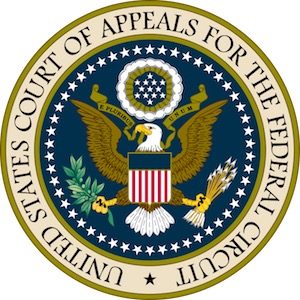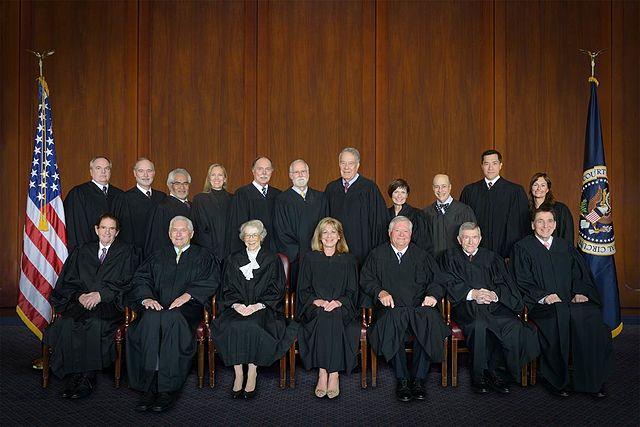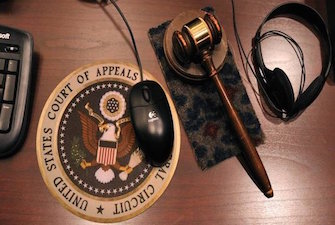Federal Circuit reverses PTAB, says Whirlpool claims are anticipated
 The U.S. Court of Appeals for the Federal Circuit recently issued a decision in Homeland Housewares, LLC v. Whirlpool Corporation. The original panel voted 2-1 in favor of Homeland Housewares and overturned a final written decision of the Patent Trial and Appeal Board (PTAB), which had confirmed that challenged claims from a Whirlpool patent were valid.
The U.S. Court of Appeals for the Federal Circuit recently issued a decision in Homeland Housewares, LLC v. Whirlpool Corporation. The original panel voted 2-1 in favor of Homeland Housewares and overturned a final written decision of the Patent Trial and Appeal Board (PTAB), which had confirmed that challenged claims from a Whirlpool patent were valid.
The Whirlpool patent before the Federal Circuit, which had the validity of the claims upheld at PTAB, is U.S. Patent No. 7581688, titled Blender with Crushed Ice Functionality. The ‘688 patent claims a cycle of operation for a blender having a motor, a container and a cutter assembly in which the motor automatically controls the cutter assembly’s rotational speed to effect a pulsing, each pulse having a constant speed phase, a deceleration phase and an acceleration phase. The resulting invention addressed shortcomings in conventional blender devices with a crushed ice functionality as those other prior art devices would often result in ice that was either over or under crushed. Further, conventional devices had difficulties mixing crushed ice with other contents to an even consistency.
Waiting on Aqua Products
 Last December, the U.S. Court of Appeals for the Federal Circuit held an en banc rehearing of the In re: Aqua Products case, which questions whether a patent owner or a petitioner holds the burden of proving patentability of proposed amended claims during an inter partes review (IPR) proceeding at the Patent Trial and Appeal Board (PTAB).
Last December, the U.S. Court of Appeals for the Federal Circuit held an en banc rehearing of the In re: Aqua Products case, which questions whether a patent owner or a petitioner holds the burden of proving patentability of proposed amended claims during an inter partes review (IPR) proceeding at the Patent Trial and Appeal Board (PTAB).
More than seven months have passed since the en banc rehearing in Aqua Products without a decision from the Federal Circuit. It could be an indication that the court is working on handing down a ruling that would greatly alter PTAB practices relating to motions to amend. In the alternative, it could be an indication that there’s a split in opinion and the Federal Circuit is still making up its mind on the matter, with multiple opinions being prepared and circulated. Interestingly, an article on In re: Aqua Products published last August by The National Law Review noted that, in its decision to grant Aqua’s petition for en banc rehearing, the Federal Circuit asked an additional question of law: who holds the burden for persuading PTAB or producing evidence to challenge the patentability of claims amended by a patent owner. That by itself could be an indication that the Federal Circuit is interested in ruling in favor of patent owners in this case.
07.25.17 | Federal Circuit Cases, Patent Issues | Gene Quinn
PTAB may invalidate claims federal courts confirmed valid
 The United States Court of Appeals for the Federal Circuit recently issued an opinion in Novartis AG v. Noven Pharmaceuticals, Inc., which affirmed the Patent Trial and Appeal Board (PTAB) invalidation of claims in related inter partes review (IPR) proceedings. The IPRs related to U.S. Patent No. 6,316,023 and U.S. Patent No. 6,335,031.
The United States Court of Appeals for the Federal Circuit recently issued an opinion in Novartis AG v. Noven Pharmaceuticals, Inc., which affirmed the Patent Trial and Appeal Board (PTAB) invalidation of claims in related inter partes review (IPR) proceedings. The IPRs related to U.S. Patent No. 6,316,023 and U.S. Patent No. 6,335,031.
Patent owners losing claims and the Federal Circuit rubber stamping the PTAB isn’t news, sadly. What makes this case different, however, is that these very same patents were previously litigated and the claims were found to be nonobvious in federal district court.
Novartis argued to the Federal Circuit that the arguments presented to the PTAB by Noven, as well as the prior art submitted to support those arguments, were the same as considered during litigation in federal court. The Federal Circuit disagreed, finding that the record in federal court was not identical to the record at the PTAB. But the Federal Circuit went further, saying that even if the records were identical, Novartis’ argument would have to fail.
05.22.17 | Federal Circuit Cases, Patent Issues | Gene Quinn
Apple v. Samsung remanded back to district court
 Recently, in a non-precedential decision, the United States Court of Appeals for the Federal Circuit remanded Apple, Inc. v. Samsung Electronics Co. back to Judge Lucy Koh (shown left) of the United States Federal District Court for the Northern District of California. In December 2016, the Supreme Court overturned a $400 million damages award for design patent infringement. In its ruling, the Supreme Court explained that damages may be limited to revenues attributable to a component of an article of manufacture and not the entire article itself. See Samsung Electronics Co. v. Apple, Inc.
Recently, in a non-precedential decision, the United States Court of Appeals for the Federal Circuit remanded Apple, Inc. v. Samsung Electronics Co. back to Judge Lucy Koh (shown left) of the United States Federal District Court for the Northern District of California. In December 2016, the Supreme Court overturned a $400 million damages award for design patent infringement. In its ruling, the Supreme Court explained that damages may be limited to revenues attributable to a component of an article of manufacture and not the entire article itself. See Samsung Electronics Co. v. Apple, Inc.
Apple requested that the Federal Circuit keep the case and the panel review the decision in light of the Supreme Court’s ruling, while Samsung requested that the Federal Circuit remand the matter to the district court for a new trial on damages. The Federal Circuit adopted neither suggestion. Instead, the Federal Circuit chose to remand the case for further proceedings, which the panel explained may or may not include a new trial on damages. Judge Koh will decide whether a new trial on damages is necessary.
02.21.17 | District Court Cases, Federal Circuit Cases, Patent Issues | Gene Quinn
Deciphering TLI Communications and FairWarning IP
Beginning in May 2016 with the Federal Court’s decision in Enfish, carrying over into the July decision in BASCOM, and then into the Court’s Fall decision in McRO (sometimes referred to as “the Blue Planet case”), the patent stakeholder community finally started receiving some much-needed guidance with respect to patent eligibility of computer-implemented inventions.
While decisions where claims have been ruled patent eligible have been helpful, decisions finding claims patent ineligible have been at least as informative, at least from a patent drafting standpoint. Indeed, as important as the aforementioned pro-patent-eligible decisions are two decisions where the Federal Circuit found the claims to be patent ineligible. In TLI Communications and then more recently in FairWarning IP, LLC v. Iatric Systems, Inc., the Federal Circuit distinguished the claims at hand from those that have been held patent eligible, which help identifies brighter lines and nuances of software practice.
12.22.16 | Federal Circuit Cases, Patent Issues, posts, software patents | Gene Quinn


No Comments
08.28.17 | CAFC, Federal Circuit Cases, Inter Partes Review, Patent Issues | Gene Quinn